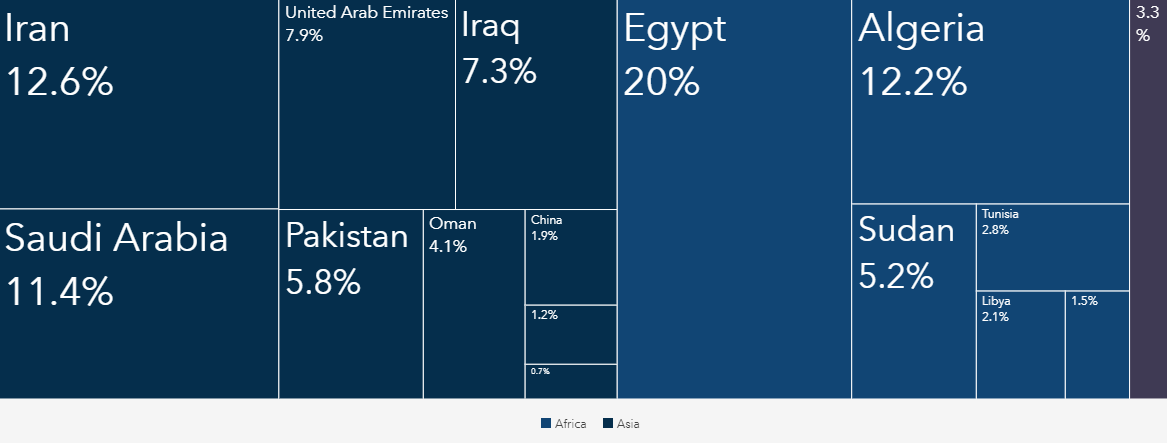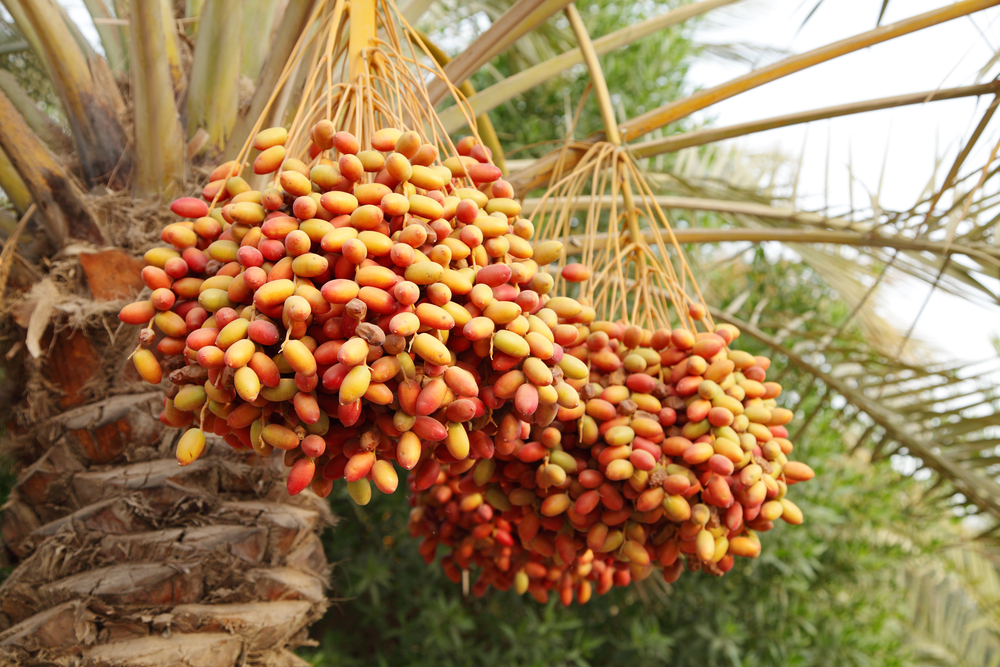The Last Date: Mandates to Improve Date Palm Production
Date Farmers Continue to Struggle
The global date production has been setting new records to meet rising consumer demand. However, the issue lies in that large amounts of produces fail to meet the quality standards. A large amount has been un-absorbed by the market due to non-compliance with quality standards and consumer needs.Although consumers’ demand for a wide variety of date palms is being reached through a highly fragmented market, where both small and large market players help target narrower niches, inadequate farming practices fail to turn production into profit. This is an emerging challenge among all date palms producers around the world.
Egypt (20% share) is the leading producer in the palm date industry. Following Egypt, Iran (12.6%), Algeria (12.2%), Saudi Arabia (11.4%), and United Arab Emirates (7.9%) were the next top producers.¹ Although all major producers have witnessed production growth from the previous year, farmers have yet to experience significant gains in their labor.

Egypt, Iran and Algeria are major palm date producers (source: Tridge)
The majority of farmers in the date palm industry are illiterate and of lower income bracket. The sociocultural status of the farmers hinders them from acquiring new technology, leaving them dependent on traditional farming methods.² Traditional cultivation system is susceptible to pest infestation, yielding poor quality dates. If enough dates get filtered out for quality assurance, the amount of harvest that reaches the market is proportionally low. Iran, for example, is known to have stringent quality requirements for date export which was instituted in order to preserve its international recognition as a major quality producer. With recent incidents of pest infestation and fungal disease, the low yield of quality dates will likely drive up the price for high-end dates.
Although some governments have developed various provisions of agricultural extension to help farmers achieve better yield, not all have been willing to take advantage of the system. While this benefited some producers like the United Arab Emirates (UAE), it became a problem for others like Pakistan whose means of delivering the service were often equipped with poor infrastructure and lack of facilities.³

Featured: Date Palm tree
Market constraints associated with an absence of market roads also have the farmers face harsher financial prospects. Because palm dates are grown in remote areas, reaching large market areas is often too far of a commute for farmers. As a result, they usually work with intermediaries to navigate the market chain. However, a long chain of marketing system means that producers have no direct access to market information, as they are often excluded from the consumer market. At its core, lack of informed decision-making and farming practices are to blame for lower than expected profit margin.
India to Remain as the World’s Top Importer
Known as the fruits of the deserts, date palm is a commercial crop in the Arab Peninsula. It can withstand high levels of soil salinity and drought. However, an excessive amount of salt can damage the plant.⁴ Date harvesting usually starts at the end of June and continues up to September. Once planted, date palms can take anywhere from 4 to 8 years to bear fruits and up to 10 years to start producing yields for commercial harvest.
Date is also a seasonal fruit, meaning it does not enjoy a year-round business, and therefore subject to price fluctuations. The import usually peaks during the major holidays and gatherings like Ramadan. Major European consumers import high-quality palm dates towards the end of the year near Christmas. India and Malaysia have less stringent quality standards import lower quality dates, which are further processed for other end-uses such as baked goods.
India will most likely remain as the top importer of palm dates in 2018, followed by UAE (7.8%), Morocco (6.9%), France (5.4%) and UK (5%).⁵ Palm dates in India carry cultural and religious significance, as it is in many Christian and Muslim countries.

Major importers of palm date (source: Tridge)
Palm date, as the result, makes a sweet gift and good flavoring for delicacies. Combination of versatile utility and numerous health benefits is part of the reason for large consumption and import. However, India’s tropical climate and monsoon, which overlaps with the date’s ripening stage, prevents producers from achieving mass production. The Indian government has no plans to invest in its date industry which will solidify India’s position as the number one importer.
What Can We Expect Next?
Tunisia possesses roughly 50% of the world’s deglet nour palm trees, which is the most preferred variety by the European Community. Tunisia, as a result, has naturally emerged as the undisputed leader in exports of palm dates to Europe. Algeria holds the next highest market share followed by Tunisia. Both countries almost exclusively produce palm dates of deglet nour variety. However, despite strong market appearance, Tunisia faces structural problems that stem from inconsistent quality due to production infestation, making it prone to competitors like Israel and France. France, ironically, is the largest importer of Tunisian palm dates; however, 40% of its import is re-exported to other countries in forms of value-added products. Although Tunisia has maintained market dominance in Europe for over two decades, quality-related problems from frequent infestations and fungal outbreaks jeopardize the country’s market share and economy.

Featured: deglet nour, a popular palm date variety in Europe
Demand for Medjool dates has been on the rise in recent years and has attracted intense interest from countries like the United Kingdom and France. However, the market growth for Medjool dates is limited by low supply and retailer hesitations.
Despite challenges with which palm date farmers are confronted, major producers in the Near East region aim to increase global production through multilateral support from global organizations.⁶ Some producers are taking initiatives on their own accord to improve quality yield. Saudi Arabia, for example, has already substantially invested in new trees and replacements to increase production capacity. Improved field management, value-added products, and post-harvest handling practices will most likely contribute to global production growth.
Reference
1.“Date Global Production and Top Producing Countries - Tridge.” Global Trading Platform Tridge, www.tridge.com/intelligences/dates/production.
2.Aregawi Lemlem, Melkamu Alemayehu, and Mossa Endris, “Date Palm Production Practices and Constraints in the Value Chain in Afar Regional State, Ethiopia,” Advances in Agriculture, vol. 2018, Article ID 6469104, 10 pages, 2018. https://doi.org/10.1155/2018/6469104.
3. Mumtaz Ali Baloch, Gopal Bahadur Thapa, "The effect of agricultural extension services: Date farmers’ Case in Balochistan, Pakistan,"Journal of the Saudi Society of Agricultural Sciences, Volume 17, Issue 3,2018, pages 282-289, https://doi.org/10.1016/j.jssas.2016.05.007.
4. Yaish, Mahmoud W., and Prakash P. Kumar. “Salt Tolerance Research in Date Palm Tree (Phoenix Dactylifera L.), Past, Present, and Future Perspectives.” Frontiers in Plant Science 6 (2015): 348. PMC. Web. 23 July 2018.
5.“HS Code 080410 | Dates, Fresh or Dried | Import - Tridge.” Global Trading Platform Tridge, www.tridge.com/hs-codes/080410-dates-fresh-or-dried/import.
6.“FAO Renews Support to Date Palm Production.” Fao.org, FAO of the UN, www.fao.org/news/story/en/item/1109541/icode/.






